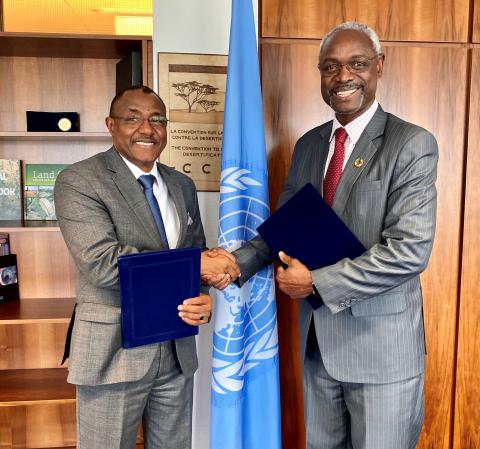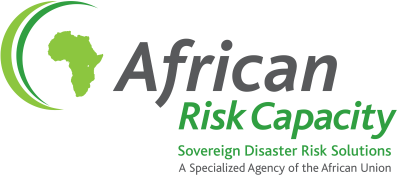
L-R: UN-ASG Mohamed Beavogui, Director-General, African Risk Capacity and UN-USG Ibrahim Thiaw, Executive Secretary, United Nations Convention to Combat Desertification with copies of the MoU.
Bonn, 23 October 2019 – Droughts have decimated communities and livelihoods in Africa for long. This year alone, over 45 million people across Africa, mostly in Eastern and Southern Africa, are food insecure due to prolonged droughts.
The Africa Risk Capacity (ARC) and the United Nations Convention to Combat Desertification (UNCCD) announced they will collaborate to support the development of financial tools to help Africa to adapt and become resilient to future drought and other extreme weather events.
The partnership will support African countries in managing the impact of extreme weather events, including drought. It will also seek to leverage private sector resources through the development of new financial instruments that can provide insurance protection and other funding to mitigate these risks.
The announcement was marked by the signing of a Memorandum of Understanding by Ibrahim Thiaw, UNCCD Executive Secretary, and Mohamed Beavogui, ARC Director General, during a two-day technical workshop convened on 22 and 23 October in Bonn, Germany.
The workshop is reviewing the proposed principles and work of the eXtreme Climate Facility (XCF). XCF is a new financial vehicle aiming to tap into capital market resources to provide financial support to countries affected by extreme weather events.
Technical experts gathered at the workshop are exploring the robustness of the core elements of the XCF. These include the financial products and their underlying index, viable alternative market-based solutions and the partnerships that are essential to deliver both the product and the aims.
The process for the XCF began in March 2014 when the African Union Conference of Ministers of Finance requested the ARC, by decision no. 927(XLVII), at the Seventh AU-ECA Joint Annual Meetings in Abuja, Nigeria, to develop a financing mechanism to enhance Member States’ response to the impacts of increasing climate volatility.
The first Special Report on Climate Change and Land released just three months ago by the authoritative Intergovernmental Panel on Climate Change warns that droughts may increase in frequency and intensity in much of Africa.
“The message is clear. We will see an increasing number of droughts with unprecedented severity, which are exacerbated by climate change. No country or region, rich or poor, is immune to the vagaries of drought. The ARC-led XCF will become an important tool to help African countries to cope effectively with the impacts of drought,” said Ibrahim Thiaw during the ceremony.
“Currently, through the Drought Initiative, the UNCCD is helping 35 of Africa’s 57 countries to create the mechanisms they need to take early action to avert drought disasters. Today, Africa is ramping up pre-emptive actions as a unified front against future drought and climate-induced disasters in the region,” Thiaw added.
“Reducing the impacts of drought and other natural disasters by helping Member States’ improve climate resilience through innovative mitigation and risk financing instruments are key to our mandate,” said ASG Beavogui.
“The Agreement signed today with UNCCD will create a functional synergy in our efforts to help countries better understand their risk profiles, improve knowledge and strengthen capacities for climate adaptation and food security,” Beavogui concluded.
As designed currently, the XCF has a three-point agenda; to connect to private sector financing, to encourage best practice in public policy and to integrate climate science into its functions.
Notes to Editors
A 2-page background note is attached to this press release.
Additional Quotes about the XCF
ASG Mohamed Beavogui, the Director-General of ARC: “Since the inception of the XCF programme in 2014, this is the first Technical Review Forum where the overall end-to-end framework is considered and reviewed. Our guiding principle since the creation of ARC is to interrogate our concepts by subjecting our models to the best available experts in that field. We did this with our drought tool, the African RiskView, which remains the best-in-class to-date for Africa. We are grateful to all our partners and industry experts that have joined us in this process.”
“The World Bank supports countries with climate adaptation measures and is committed to working with countries to strengthen financial resilience against climate and disaster shocks,” said Mr. Miguel Navarro-Martin, Manager of Banking Products, World Bank Treasury. “Our focus is on helping countries to protect their fiscal accounts against external risks. The XCF concept being developed by ARC provides an opportunity for African countries to access financial solutions to manage disaster risk and to fund a portfolio of climate resilient investments,” he further stated.
Commending ARC and UNCCD on the initiative, Dr. Astrid Zwick, Head of InsuResilience Secretariat remarked, “The centrality of our collaboration with countries is to enable a more timely and reliable post-disaster response. Critical to this are preparedness and readiness using climate disaster risk finance and insurance solutions. The XCF promises to be one of those instruments that can complement ongoing efforts in countries to avert, minimize and address climate disaster risks by strengthening local adaptive capacity and resilience. We are glad to be part of this process.”
Quotes Relating to the MoU
UN-ASG Mohamed Beavogui, the Director-General of ARC: “The mandate of the UNCCD resonates with ARC’s mission. Reducing the impacts of drought and other natural disasters by helping Member States’ improve climate resilience through innovative mitigation and risk financing instruments are key to our mandate. The Agreement will create a functional synergy in our efforts to help countries better understand their risk profiles, improve knowledge and strengthen capacities for climate adaptation and food security.
Executive Secretary Ibrahim Thiaw: “Today marks the beginning of a unified front against drought and climate-induced disasters in the African region. We currently manage programmes closely related to climate adaptation and natural disaster risk, including the Drought Initiative. Our key aims are to support the establishment and implementation of national drought plans and mobilise innovative financial instruments to better mitigate the risks of extreme climate situations.”
For technical information on XCF:
Oluwatosin ADESIYAN, Lead Advisor, XC
oluwatosin.adesiyan@wfp.org
Media Inquiries about the ARC:
Chinedu Moghalu, Senior Communications Specialist
chinedu.moghalu@arc.int; chinedu.moghalu@wfp.org
For technical information about the UNCCD Contact:
Ms. Camilla Nordheim-Larsen, Programme Coordinator
For media interviews during the Bonn meeting, contact:
Wagaki Wischnewski, Public Information and Media Officer
About Africa Risk Capacity
The ARC Agency leads the ARC Group, a development finance institution that provides financial tools and infrastructure to help countries manage natural disaster risk and adapt to climate change. The Agency currently has a membership of 34 African Union (AU) Member States and is supervised by a ministerial-level governing board elected by its Conference of the Parties. The African Risk Capacity model is home-grown, innovative, cost-effective, and is proving that it can assist member-states to strengthen their capacities to better plan, prepare and respond to extreme weather events and natural disasters, thereby achieving the food security for their populations. Since 2014, 32 policies have been signed by Member States with US$73million paid in premiums for a cumulative insurance coverage of US$553million for the protection of 55million vulnerable population in participating countries.
About UNCCD
The UNCCD is an international agreement on good land stewardship. It helps people, communities and countries to create wealth, grow economies and secure enough food and water and energy, by ensuring land users have an enabling environment for sustainable land management. Through partnerships, the Convention’s 197 Parties set up robust systems to manage drought promptly and effectively. Good land stewardship based on a sound policy and science helps integrate and accelerate the achievement of the Sustainable Development Goals, builds resilience to climate change and prevents biodiversity loss.





